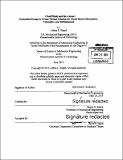| dc.contributor.advisor | Sanjay E. Sarma. | en_US |
| dc.contributor.author | Siegel, Joshua Eric | en_US |
| dc.contributor.other | Massachusetts Institute of Technology. Department of Mechanical Engineering. | en_US |
| dc.date.accessioned | 2014-12-08T18:58:05Z | |
| dc.date.available | 2014-12-08T18:58:05Z | |
| dc.date.copyright | 2013 | en_US |
| dc.date.issued | 2013 | en_US |
| dc.identifier.uri | http://hdl.handle.net/1721.1/92230 | |
| dc.description | Thesis: S.M., Massachusetts Institute of Technology, Department of Mechanical Engineering, 2013. | en_US |
| dc.description | Cataloged from PDF version of thesis. | en_US |
| dc.description | Includes bibliographical references (pages 109-111). | en_US |
| dc.description.abstract | This paper describes the development and testing results for a system of Cloudbased mirrors for physical vehicles called "Avacars." Avacars duplicate parameters from On-Board Diagnostics, accelerometers, and GPS sensors installed in a vehicle as part of the MIT CloudThink set of standards. These Avacars may then be used as input and output for a diverse set of applications. Avacars are created by a custom-designed portable cellphone used to instrument a vehicle without user intervention and stored to a secure and private server. The first section of the document details the background for the Avacar project. It describes available technology and current unmet needs, and presents the solution of an open-standard based application platform for improving access to vehicle diagnostic data and creating new opportunities to build applications. The second section explains the need for an open platform in the context of end-user and developer feedback along with canonical application examples including vehicle-miles-traveled (VMT) monitoring and generation of fuel metrics to validate programs similar to the United States Corporate Average Fuel Economy (CAFE) standards. This section also explores the value of open and interoperable data as well as transparency in hardware design. Section three describes the implemented hardware and novel features facilitated by the hardware, including power saving and location-aware application development. This section includes an analysis of the problems faced in the design and deployment process, as well as steps the author might have taken to address these issues prior to their manifestation. Section four discusses the results of the hardware and platform in testing, and includes visualizations of data collected with the CloudThink platform. The author found that the hardware and platform were capable of addressing the needs of both VMT and fuel economy monitoring applications, though further testing is necessary to validate the results. The author also successfully utilized the platform to extend applications to incorporate non-OBD vehicle sensors and actuators. This allows for the creation of large datasets while providing value to users who chose to test the system, in the form of car applications that repackage information into digestible formats or adding features otherwise not typically available, e.g. unlocking from a cell phone. The paper closes by exploring future use opportunities for the CloudThink platform in monitoring non-automotive sensor enabled devices. | en_US |
| dc.description.statementofresponsibility | by Joshua E. Siegel. | en_US |
| dc.format.extent | 111 pages | en_US |
| dc.language.iso | eng | en_US |
| dc.publisher | Massachusetts Institute of Technology | en_US |
| dc.rights | M.I.T. theses are protected by copyright. They may be viewed from this source for any purpose, but reproduction or distribution in any format is prohibited without written permission. See provided URL for inquiries about permission. | en_US |
| dc.rights.uri | http://dspace.mit.edu/handle/1721.1/7582 | en_US |
| dc.subject | Mechanical Engineering. | en_US |
| dc.title | CloudThink and the Avacar : embedded design to create virtual vehicles for cloud-based informatics, telematics, and infotainment | en_US |
| dc.title.alternative | Cloud Think and the Avacar : embedded design to create virtual vehicles for cloud-based informatics, telematics, and infotainment | en_US |
| dc.title.alternative | Embedded design to create virtual vehicles for cloud-based informatics, telematics, and infotainment | en_US |
| dc.type | Thesis | en_US |
| dc.description.degree | S.M. | en_US |
| dc.contributor.department | Massachusetts Institute of Technology. Department of Mechanical Engineering | |
| dc.identifier.oclc | 897472909 | en_US |
